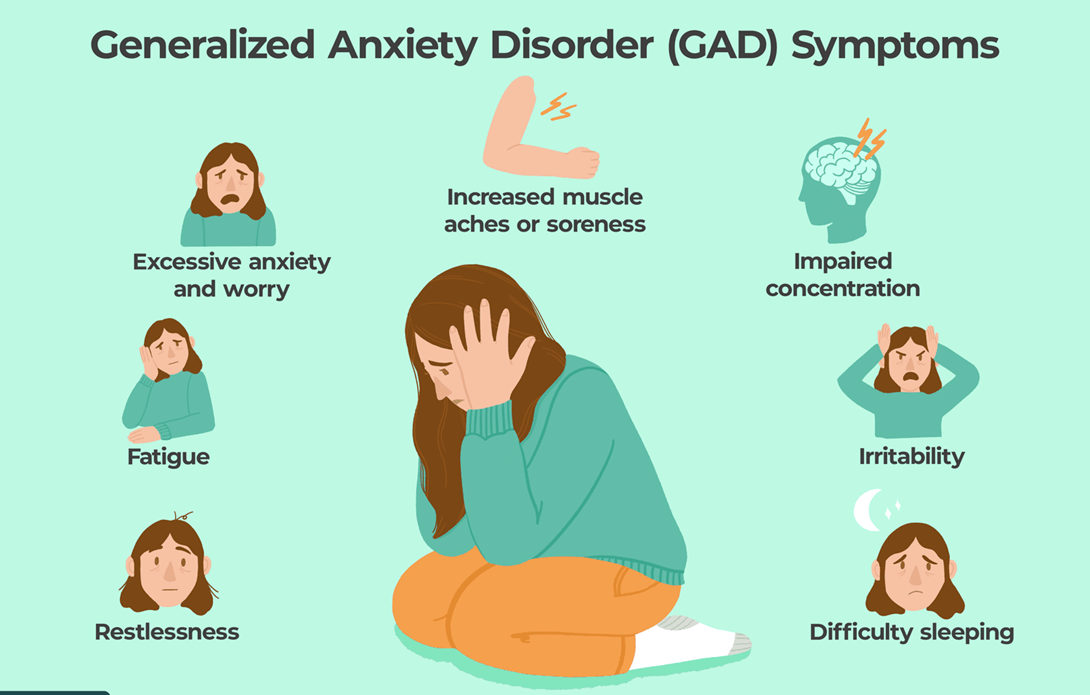A college student has been diagnosed with Generalized Anxiety Disorder (GAD). Which of the following symptoms should a campus nurse expect this client to exhibit? Select all that apply.
Hyperventilation
Irritability
Anorexia
Insomnia
Fatigue
Correct Answer : A,B,D,E
Choice A: Hyperventilation
Hyperventilation is rapid breathing that usually occurs because of anxiety or panic. This leads to low levels of carbon dioxide in your blood which causes a number of symptoms. Hyperventilation in anxiety can be a tricky thing to understand. On one hand, it can feel like you're suffocating or not getting enough air. On the other hand, hyperventilation can also cause shortness of breath, chest pain, and lightheadedness.
Choice B: Irritability
Irritability is a common symptom of Generalized Anxiety Disorder (GAD). Individuals with GAD often experience severe feelings of fear and unease and report feeling restless and irritable that interfere with the quality of their life.

Choice C: Anorexia
While there is a relationship between anxiety disorders and anorexia nervosa, anorexia is not a common symptom of Generalized Anxiety Disorder (GAD). Anorexia nervosa is a separate disorder that involves a fear of gaining weight and a distorted body image.
Choice D: Insomnia
Insomnia is highly prevalent in psychiatric disorders, and it has significant implications. The anxiety that characterizes GAD often interferes with the ability to sleep and leads to insomnia. This is not unexpected. Anxiety might be viewed as an inappropriate escalation of a response called arousal.
Choice E: Fatigue
Fatigue is a common symptom of Generalized Anxiety Disorder (GAD). Individuals with GAD may feel restless and have trouble relaxing. They may also tire easily or feel tired all the time.
Nursing Test Bank
Naxlex Comprehensive Predictor Exams
Related Questions
Correct Answer is ["C","D","E"]
Explanation
Choice A reason: While hobbies can be therapeutic, they are not the primary focus of nursing interventions for a client with schizotypal personality disorder and hygiene issues.
Choice B reason: Establishing close relationships is beneficial but may not be the immediate focus for a client who is struggling with basic self-care.
Choice C reason: Improving functioning in the community is a key goal for clients with schizotypal personality disorder to help them integrate better into society.
Choice D reason: Developing social skills is essential for clients with schizotypal personality disorder to interact more effectively with others.
Choice E reason: Development of self-care skills is crucial, especially given the client's unkempt appearance and lack of bathing, indicating a need for better personal hygiene practices.
Correct Answer is ["A","B","D"]
Explanation
Choice A reason: This statement is an example of rationalizing the spouse's behavior, which can perpetuate the cycle of substance abuse.
Choice B reason: Providing money for drugs, even under the guise of preventing theft, is enabling because it facilitates the continuation of the substance abuse.
Choice C reason: Suggesting rehab as a condition for coming home is not enabling; it is a step towards addressing the substance use disorder.
Choice D reason: Calling in sick on behalf of the spouse to cover for their potential job loss due to substance abuse is an enabling behavior that prevents the spouse from facing the natural consequences of their actions.
Choice E reason: Securing valuables to prevent theft due to the spouse's substance abuse is also enabling because it adjusts normal routines to accommodate the substance use, rather than confronting or addressing the issue.
Whether you are a student looking to ace your exams or a practicing nurse seeking to enhance your expertise , our nursing education contents will empower you with the confidence and competence to make a difference in the lives of patients and become a respected leader in the healthcare field.
Visit Naxlex, invest in your future and unlock endless possibilities with our unparalleled nursing education contents today
Report Wrong Answer on the Current Question
Do you disagree with the answer? If yes, what is your expected answer? Explain.
Kindly be descriptive with the issue you are facing.
